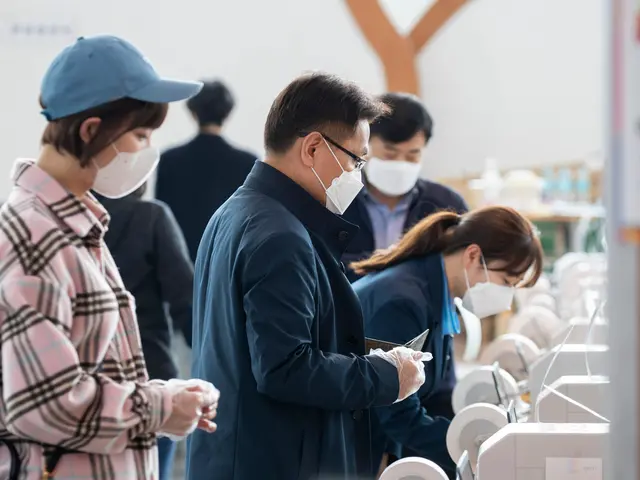South Korean President Moon Jae-in's ruling Democratic Party has won a landslide victory in parliamentary elections held amid the COVID-19 pandemic.
The governing Democratic Party secured 163 directly-contested constituency seats, and its sister Platform Party won 17 proportional representation (PR) slots, the National Election Commission said Thursday.
It marked the first time since the constitution was amended in 1987 to end the past military dictatorship and adopt democratic elections that a single political party won three-fifths of the total seats in parliamentary elections.
The quadrennial polls for the 300 members of the National Assembly were held at 14,330 voting stations nationwide on Wednesday to let voters cast ballots for 253 constituency seats and 47 PR slots.
The main conservative opposition United Future Party and its satellite party garnered 84 constituency seats and 19 PR seats each.
The minor progressive Justice Party held one constituency seat and five PR slots, while the center-left Open Democratic Party and the centrist People's Party gained three respective PR seats.
Five independent candidates obtained the remaining constituency seats in the parliamentary elections, widely seen as a mid-term referendum on the Moon government.
Democratic Party Chairman Lee Hae-chan told a party meeting that he felt a "heavy responsibility" for the election results before being glad about the victory, urging the lawmakers-elect to keep humble and feel heavily responsible for people's livelihood and state affairs.
He expressed deep gratitude for people's support, vowing to prevail over the COVID-19 outbreak and preemptively respond to the economic fallout from the virus spread.
In the latest tally, the country reported 22 more confirmed cases of the COVID-19 for the past 24 hours, raising the total number to 10,613. The daily caseload stayed below 50 for the eighth consecutive day.
Former Prime Minister Lee Nak-yon of the Democratic Party won a parliamentary seat against Hwang Kyo-ahn, chief of the United Future Party, in the symbolic Jongno district in central Seoul.
Their race drew public attention as they were seen as powerful presidential hopefuls in the liberal and conservative blocs each. Hwang stepped down from his chairmanship for the opposition party's defeat in the polls.
The election was held at a time of the COVID-19 outbreak across the world that delayed elections in other countries.
Preparations were made to protect voters from possible infection while casting ballots, by disinfecting voting stations and marking the standing line at intervals of at least one meter.
Voters were allowed to enter the voting booths only after wearing masks, checking body temperature, rubbing their hands with sanitizer and putting on disposable plastic gloves.
Of the 43.99 million voting-age South Koreans, 29.12 million went to the polls for the general elections. The turnout of 66.2 percent was the highest in 28 years since 1992.
Of the total voters, 26.69 percent voted in advance on Friday and Saturday. It was the highest since the early voting system was introduced in 2013.
During the electioneering, the Democratic Party zeroed in on the government's successful response to the COVID-19, adopting the campaign slogan of "We protect the people."
President Moon's approval rating has risen in recent weeks as positive public views spread over the government's quarantine efforts and measures to tackle the economic fallout from the pandemic.
The mood of this year's election campaign, usually energetic and noisy, was relatively dull and quiet as campaigners were advised to wear masks and avoid handshakes and large-scale rallies.
To secure the suffrage of those under the mandatory two-week self-quarantine, the election organizing body allowed them to leave home out of quarantine to go to the polls for a set period of time.
They were required to wear masks and report to health officials before leaving home and after arriving home, and also to walk or drive alone to the voting stations in less than half an hour.
Of the 59,918 voters under the compulsory quarantine, 18.6 percent, or 11,151, voted in separately arranged polling booths.
Six of the voters under quarantine violated quarantine rules while casting ballots, according to the health authorities.
Three of them will be reported to the police as they visited internet cafe and billiard room, or discount outlet and a friend's house, or tried to change the mobile phones on the way to or from the polling stations.
If they violate the rules, they will face up to one-year imprisonment or up to the fine of 10 million won (about 8,200 U.S. dollars).
(CGTN)
 简体中文
简体中文

